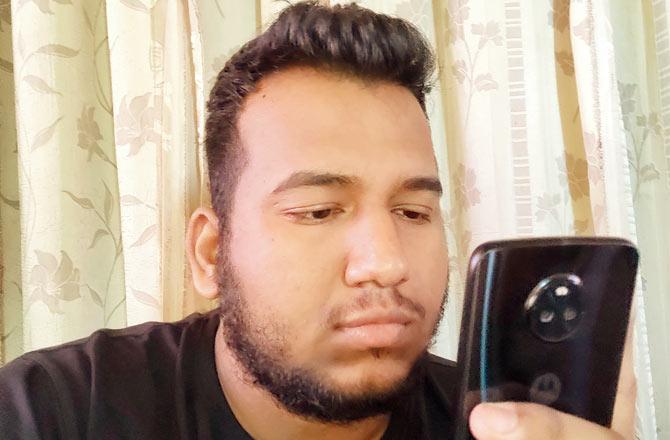The lockdown has seen an uptick in Internet and smartphone usage. This, experts warn, can have lasting repercussions on mental health, especially among the younger

It's often said that desperate times call for desperate measures. Roughly half-way into the government-mandated lockdown, a study by BARC India and Nielsen indicates that millions of Indian men, women and children — who are deprived of social contact and their usual means of entertainment — are taking to their screens with new-found gusto. Another report by digital news publisher BISBO indicates that children and young adults up to the age of 21 years are watching the most television, while smartphone usage has gone up to nearly 25 hours per week, with 33- to 44-year-olds spending most of their waking hours glued to their phone screens. Dr Nahid Dave, a psychiatrist at Thought Matters, says that this uptake in screen time can have lasting implications on mental health. "While most people believe that they will automatically switch back once they resume their regular routines, too much screen time can have lasting implications on mental health and physical well-being," she observes.

Dr Nahid Dave
Too much of a good thing
Urban nuclear families are the hardest hit, says Balasubramanian G, a counselling psychologist and an expert in addiction psychology. "In such households, adults are preoccupied with juggling their full-time jobs with household chores. The amount of time they are able to devote to their children is compromised. This can either lead them to become too controlling or neglect their children altogether," he says. Consequently, such children turn to the Internet for entertainment, and to socialise with their peers. For adults, social media plays a leading role in helping to reduce stress. However, many students and adults are becoming reliant on Internet gaming, pornography, compulsive shopping and binge-watching as means to alleviate both boredom and stress. Dr Sagar Mundada, a psychiatrist at Health Springs, points out that individuals with a history of poor self-control can veer dangerously close to addiction, aided by the easy availability of high-speed Internet. These addictions, he says, will continue to pose problems post the lockdown in the absence of timely precautions. "Those affected will experience changes in their sleep routines and appetites. Screen addiction can also lead to insomnia, mood disorders, restlessness and issues with memory and attention spans. Watching too many viral videos about the pandemic can lead to anxiety, which affects their ability to focus on their routine activities," says Balasubramanian.

Balasubramanian G
Screening your screen
Internet usage, during the lockdown, is typically for four reasons, says Dr Dave. These include communication (chats and video calls), entertainment (movies or series), social media and education/enrichment. "Most people use their screens only for the first three purposes. The fourth is neglected. It's important to understand exactly how much time you are spending on each. Most people are in denial about how many hours they spend online; timing your usage will make you more conscious and judicious while using devices and gadgets," she says. Other strategies include:
1 Allocate time: Dr Dave warns that bombarding yourself with too much information can create anxiety. "While you may not remember the exact piece of news or meme, being constantly exposed to death rates or other alarming statistics can affect your subconscious and make you fearful," she says. Fatima Agarkar, educationist at KA EduAssociates, recommends reducing the amount of time your children are exposed to televised news. Instead, she suggests taking the lead to update them about relevant facts simply but clearly.

Dr S Mundada
2 Keep a schedule: "Many schools are conducting virtual lessons for students. These take up four to five hours of their day. By the end of their lessons, most children automatically tire of their screens. Parents ought to offer them meaningful alternatives. Make sure your child has at least three hours of non-screen time. Reading aloud to children, and board and card games can keep them engaged. Involve your children in creating a daily schedule — and also for simple household chores, Agarkar adds.
3 Socialising is key: "Be aware that these are extraordinary times, and children [especially those who live in all-adult households] will need some social interaction with their peers. Children need to laugh with their friends and to discuss the day's happenings. An extra hour of phone time with their friends won't hurt — you could break it up into smaller segments across the day," says Agarkar. Dr Dave emphasises on the importance of one-on-one engagements, via chat, phone or video calls, as opposed to mindless browsing on social media. "Studies indicate that the latter can make you lonelier," she explains.

Fatima Agarkar
4 Look inwards: "While some people are productive and view these 21 days as an incredible opportunity for self-improvement, this may not necessarily be the case for others. These constant comparisons can create anxiety. It's crucial to also allocate time towards doing something constructive. These don't have to be ambitious targets — simply introspecting about the things and people you care about can be useful. Mindfulness exercises, such as breathing and meditation, can improve your attention span, focus and overall mental well-being," suggests Dr Dave.
5 Use hacks: Even with addictive pursuits such as online games and porn, being firm about switching off at a pre-determined time can go a long way, says Dr Mundada. Use apps that automatically turn your gadget off, if you have trouble doing so yourself. If mindless browsing is a problem, he recommends switching to a slower connection (such as your phone Internet) instead of using high-speed broadband. "Waiting for those extra 10 seconds while the video buffers can temper the dopamine kick in your brain, and things that seemed so irresistible won't matter as much," he explains.
A mixed blessing

Although I am not typically too attached to social media, working from home has changed things. I often find myself reaching for my phone to mindlessly browse through my feeds during breaks. I've tried to limit this and, instead, be more particular of my screen time usage. I turn to social media for light-hearted entertainment, chat with friends and to keep up with the news. Surprisingly, I've managed to reconnect with old friends who I had not spoken to in years! The only downside is that it can sometimes be overwhelming to watch how creative and productive some people are during this phase. This, at times, makes me feel inadequate about my achievements.
Joyson Castelino, 23, communications professional
Goals for social distancing

I've found that most people on social media platforms are overwhelmingly negative and fearful. Fortunately, most of my screen time is engaged in academics, thus limiting my exposure to social feeds. I limit my screen time to three hours a day. Although at times, I exceed this limit, it makes me more conscious and mindful. In the same breath, social media is an effective learning tool and keeps me engaged with my friends — I spend my time online chatting with my peers, sharing news and resources, and blogging.
Rainna Goel, 14, student and author
Catch up on all the latest Mumbai news, crime news, current affairs, and also a complete guide on Mumbai from food to things to do and events across the city here. Also download the new mid-day Android and iOS apps to get latest updates
 Subscribe today by clicking the link and stay updated with the latest news!" Click here!
Subscribe today by clicking the link and stay updated with the latest news!" Click here!









